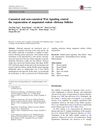iNOS Inhibits Hair Regeneration in Obese Diabetic (ob/ob) Mice
May 2018
in “
Biochemical and Biophysical Research Communications
”

TLDR iNOS contributes to hair loss in obese diabetic mice and blocking it may encourage hair growth.
The study from July 1, 2018, found that inducible nitric oxide synthase (iNOS) plays a role in hair loss associated with obesity and diabetes by prolonging the telogen phase of the hair cycle in obese diabetic (ob/ob) mice. By creating iNOS-deficient ob/ob mice and administering an iNOS inhibitor, the researchers observed an enhanced transition from the telogen to anagen phase, indicating that inhibition of iNOS could promote hair growth. Conversely, a nitric oxide donor extended the telogen phase in wild-type mice. The study suggests that iNOS-derived nitric oxide contributes to hair loss under inflammatory conditions seen in diabetes and that iNOS inhibitors might serve as potential treatments for alopecia. The number of mice used in the experiments ranged from four to eight per group for genetic studies and six to seven per group for inhibitor treatment studies.













